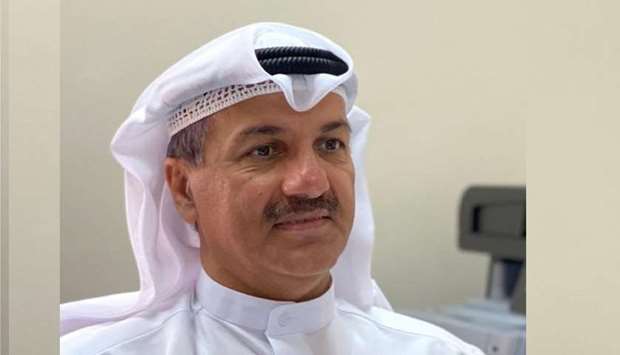* Official stresses readiness of country's healthcare system to provide care for high number of cases
* Overall bed capacity of Hazm Mebaireek General Hospital almost tripled from 118 beds to 330, which can be further increased to 560 beds (ICU and non-ICU) through a field hospital
* More than 135 patients with Covid-19 have been treated in the hospital’s 150-bed ICU
* More than half of these patients have recovered enough to be transferred to a non-critical care unit or released into home quarantine
Qatar has sufficient healthcare facilities and staff to cope with the current number of Covid-19 patients who require intensive treatment and advanced respiratory support, said Dr Ahmed al-Mohamed, acting chairman of Hamad Medical Corporation’s (HMC) Intensive Care Units (ICU).
The country is prepared should the numbers rise, he stated.
“Late last month, Hazm Mebaireek General Hospital was designated as a dedicated Covid-19 treatment centre due to its state-of-the-art facilities, which allowed us to quickly convert it into a hospital able to provide the highest level of care to critically ill Covid-19 patients,” said Dr al-Mohamed, who is also acting medical director of Hazm Mebaireek General Hospital (HMGH), in a statement issued by HMC.
“We have almost tripled the overall bed capacity of the hospital, increasing from 118 beds to 330. And we can further increase to 560 beds (ICU and non-ICU) through the use of a field hospital,” he added.
Dr al-Mohamed says to date, over 135 patients with Covid-19 have been treated in the hospital’s 150-bed ICU, with more than half of those patients having recovered enough to be transferred to a non-critical care unit or released into home quarantine, or a designated quarantine facility.
He says Qatar has been able to cope so well with the pandemic because of widespread testing and ample capacity to treat patients who require hospital-level care.
Dr al-Mohamed continued, “Patients at HMC receive world-class care from experienced, highly qualified medical, nursing and allied healthcare professionals. HMGH is one of five Covid-19 treatment facilities, with The Cuban Hospital, the Communicable Disease Center, Mesaieed Hospital and the newly opened Ras Laffan Hospital also being dedicated Covid-19 treatment facilities, each able to provide ICU-level care.
"Here at HMGH, we have a team of more than 250 doctors, nurses, physiotherapists, respiratory therapists, clinical pharmacists, dietitians and social workers, all specialists in caring for critically ill patients. Working together the whole health system took the time to prepare for this crisis. We ensured staff had the proper training and, where necessary, we re-purposed existing resources and facilities to ensure optimal care for all patients, especially the seriously ill."
“Should the number of Covid-19 patients who require ICU-level care rise, HMC has contingency plans in place which would enable us to redeploy manpower from other parts of the healthcare system," he stressed. "Severely ill Covid-19 patients require sophisticated treatment and we have not only sufficient numbers of staff and equipment but also the specialised skills and experience required to care for the sickest patients."
A shortage of ventilators - mechanical breathing machines needed to keep people with severe pneumonia and respiratory failure alive – has been a challenge faced by many countries in caring for Covid-19 patients, but Dr al-Mohamed says there is no shortage of qualified staff or equipment in Qatar.
To date, most Covid-19 patients treated in the ICU at HMGH have been between the ages of 35 and 70 years old, with many having existing medication conditions, namely high blood pressure. Dr al-Mohamed says the average length of stay for Covid-19 patients in the ICU has been between two and three weeks, but he noted patients with existing medical conditions often take longer to recover from the virus. He says it is essential that the entire country continues working together to stop the spread of Covid-19.
“Because of the thoughtful actions and early defensive steps taken by Qatar’s leadership, it is unlikely that we will see the very high numbers of deaths they are seeing in other regions of the world. However, the public must remember this is a very serious virus; it can be fatal. We must continue to adhere to infection prevention measures, which include social distancing. While we are fully prepared to care for the sickest patients, we need to continue working together to ensure that our hospital system, and specifically our ICUs, are not overwhelmed. The horrific scenarios we have seen around the globe need not apply here, but we must all work together to stop the spread of this virus,” added Dr al-Mohamed.

